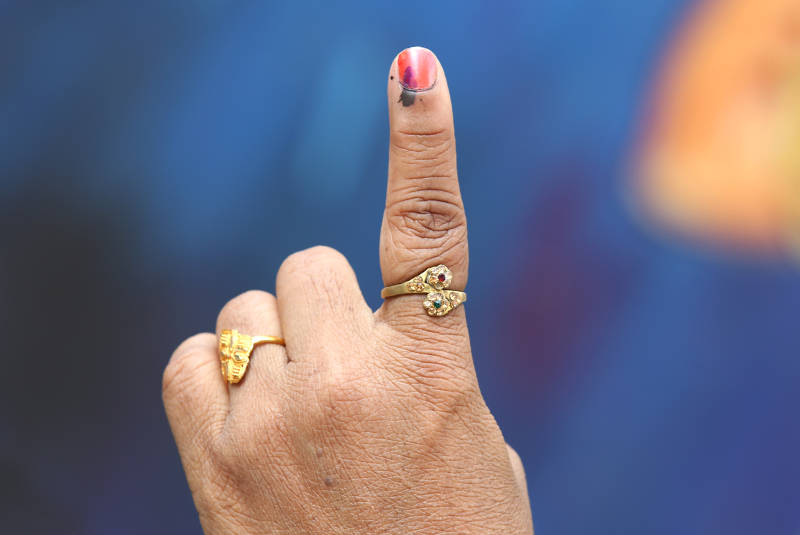Santiago Martin, the Managing Director of Future Gaming and Hotel Services, purchased electoral bonds worth 1368 crores. Was he trying to game the ‘mother of democracy’? Or, was the ‘Lottery King,’ as he was known, gambling away his vast fortune (and future) under duress from political overlords?
Similarly, ‘Megha Krishna Reddy,’ the man who runs Megha Engineering And Infrastructure Limited, purchased electoral bonds worth 1200 crores. The company—which bagged central and state government contracts for irrigation, hydrocarbons, electric buses, hydro and thermal power—was the second biggest buyer of electoral bonds.
These two men are not isolated cases. Some of India’s biggest corporations purchased electoral bonds to the tune of thousands of crores. A Reliance group company purchased electoral bonds worth 410 crores.
India’s energy companies—across mining, coal, gas, thermal power, solar and wind power, hydropower, transmission lines, electric mobility and smart meter sectors—purchased over 3600 crores worth of electoral bonds, accounting for nearly 30 per cent of the total purchases.
Vedanta Limited purchased electoral bonds worth 400 crores. Similarly, Aditya Birla Group (464 Crores), RP Sanjiv Goenka Group (492 crores), Rungta Sons Pvt Ltd (100 crores), Torrent Power (106 crores), Jindal Steel and Power Limited and Genus Power Infrastructure Limited purchased electoral bonds.
‘Green energy’ companies contributed around 230 crores. Ostro Jaisalmer Pvt Ltd and Ostro Madhya Wind Pvt Ltd, which are part of the ReNew Power Group, purchased electoral bonds worth 17 crores. GreenKo Group purchased 35 crores worth of electoral bonds.
Yashodha hospitals purchased 162 crores worth of electoral bonds. Pharmaceutical companies—such as Dr Reddy’s Laboratories (80 crores), Torrent Pharmaceuticals (77.5 crores), Natco Pharma (69.25 crores), Biocon Limited (6 crores), Cipla (39.2 crores)—purchased electoral bonds.
India’s most well-known banking and finance companies have also purchased electoral bonds. Bajaj Finance, Piramal Enterprises, and Edelweiss Group collectively purchased electoral bonds worth Rs 123 crore between April 1, 2019 and January 2024. Ironically, India’s billionaire banker, Uday Kotak, who publicly questioned electoral bonds in 2019, purchased electoral bonds through an entity called Infina Finance Private Limited in three lots. Despite suffering a loss of 53.7 crores in 2019-20, the company purchased electoral bonds worth 35 crores.
Four ‘start-ups’ purchased electoral bonds just months after they were established. Vasavi Avenues LLP bought bonds worth 5 crores—just three months after it was established. Bain Global Resources LLP bought bonds worth 5 crores—just four months after it was formed.
Between 2020 and 2021, twenty companies formed during the pandemic purchased bonds worth 100 crores within two years after they were established. Two companies incorporated in 2023—Tsharks Infra Developers Pvt Ltd and Tsharks Overseas Education Consultancy Pvt Ltd—purchased electoral bonds worth 7.5 crore, their only such transaction.
Even loss-making companies went way beyond their means to purchase electoral bonds. Keventer Group Company purchased electoral bonds worth over 500 crores, 100 times above its annual profit. Qwik Supply Chain, which purchsed bonds worth 410 crores, made a profit of only 110 crores. Despite running in losses for four years, Bharti Airtel and Navayuga Engineering purchsed bonds worth ₹198 crore and ₹55 crore, respectively.
As of now, we do not know who has given what to whom and for what. But we do know that the Bharatiya Janata Party (BJP), which received over 7800 crores, is the biggest beneficiary of the electoral bond scheme. Incidentally, the Trinamool Congress (TMC) received over 1396.94 crores, second after the BJP. The Congress Party is third in the order, having received over 1334.36 crores. Other political parties received money in the order given below:
The Bharata Rashtra Samiti (BRS): 1322 crores
The Bharatiya Janata Dal (BJD): 944.5 crores
Dravida Munnetra Khazhagam (DMK): 656.7 crores
YSR Congress Party (YSRCP): 442.8 crores
Telugu Desam Party (TDP): 181. 35 crores
Aam Aadmi Party (AAP): 70.70 crores
Shiv Sena: 60.4 crores
Rashtriya Janata Dal: 56 crores
Nationalist Congress Party (NCP): 50.51 crores
Sikkim Krantikari Morcha: 15.5 crores
Akali Dal: 7.26 crores
National Conference: 50 Lakhs
Sikkim Democratic Front: 50 Lakhs
Why would corporations purchase electoral bonds worth thousands of crores to fund political parties? Is it out of the goodness of their heart? Is it to foster democracy? Or is it legitimised bribery, quid pro quo or extortion?
A cursory look at the manner and method in which electoral bonds have been purchased reveals a pattern. For instance, Rithwik Projects Private Limited, a company owned by the BJP Member of Parliament C.M. Ramesh, purchased electoral bonds worth 5 crores soon after it bagged a 1098 crore Engineering, Procurement and Construction (EPC) contract for Sunni Hydroelectric project in Himachal Pradesh, just before the assembly elections in Tripura, Meghalaya and Nagaland. Two months later, the company purchased bonds worth 40 crores. Interestingly, the company was awarded the contract days after another project, the Tapovan Vishnugad Hydroelectric project in Uttarakhand, collapsed due to underground tunnelling at an ecologically sensitive site.
Similarly, Santiago Martin, the ‘Lottery King,’ purchased the bonds after the Enforcement Directorate accused him of participating in a criminal conspiracy to withhold unsold lottery tickets unlawfully and falsely claim top prizes on such tickets. The Enforcement Directorate attached 411 crores to the firm’s bank account.
Megha Engineering and Infrastructure Limited has been under investigation by the Income Tax Department since 2019, allegedly for tax evasion.
Vedanta Limited, which purchased bonds worth 410 crores, did so after it was implicated in a bribery case involving a Member of Parliament in 2022; it was also under investigation by both the CBI and the Enforcement Directorate for potential money laundering activities.
Haldia Energy Limited, which purchased bonds worth 377 crores, did so after it faced allegations of irregularities related to a coal field and was charged with corruption by the Central Bureau of Investigation (CBI).
Yashoda Super Speciality Hospitals, which now denies purchasing bonds worth 162 crores, was accused of tax evasion by the Income Tax department in December 2020.
Uday Kotak had a long-running feud with the Reserve Bank of India, which was pressurising him to bring down his shareholding to 10 per cent. However, after Kotak purchased electoral bonds, the RBI relented and allowed him to hold a 26 per cent stake in the bank.
India’s Finance Minister Nirmala Sitharaman, the fountain of truth, said that it was a ‘huge assumption’ to link ED raids with electoral bond purchases and asserted that the law helped move from a wild system which made people a ‘law-unto-themselves.’
The electoral bond scheme brought in by the BJP through a series of amendments is a case study in the murky art of political funding. The data from electoral bonds shows how the political class and crony capitalists rigged the ‘world’s largest democracy.’
-30-
Copyright©Madras Courier, All Rights Reserved. You may share using our article tools. Please don't cut articles from madrascourier.com and redistribute by email, post to the web, mobile phone or social media.Please send in your feed back and comments to editor@madrascourier.com











